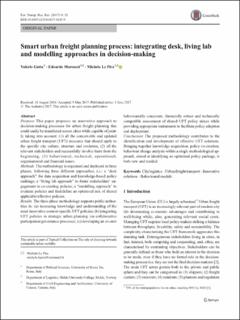| dc.contributor.author | Gatta, Valerio | |
| dc.contributor.author | Marcucci, Edoardo | |
| dc.contributor.author | Le Pira, Michela | |
| dc.date.accessioned | 2023-03-18T15:40:55Z | |
| dc.date.available | 2023-03-18T15:40:55Z | |
| dc.date.created | 2017-06-07T10:28:55Z | |
| dc.date.issued | 2017 | |
| dc.identifier.citation | European Transport Research Review. 2017, 9 (3), 1-11. | en_US |
| dc.identifier.issn | 1867-0717 | |
| dc.identifier.uri | https://hdl.handle.net/11250/3059085 | |
| dc.description.abstract | Purpose This paper proposes an innovative approach to decision-making processes for urban freight planning that could easily be transferred across cities while capable of jointly taking into account: (1) all the conceivable and updated urban freight transport (UFT) measures that should apply to the specific city culture, structure and evolution, (2) all the relevant stakeholders and successfully involve them from the beginning, (3) behavioural, technical, operational, organisational and financial issues. Methods The methodology is organised and deployed in three phases, following three different approaches, i.e.: a Bdesk approach^ for data acquisition and knowledge-based policy rankings; a Bliving lab approach^ to foster stakeholders’ engagement in co-creating policies; a Bmodelling approach^ to evaluate policies and find/define an optimised mix of shared applicable/effective policies. Results The three-phase methodology supports public authorities in: (a) increasing knowledge and understanding of the most innovative context-specific UFT policies; (b) integrating UFT policies in strategic urban planning via collaborative participation/governance processes; (c) developing an ex-ante behaviourally consistent, financially robust and technically compatible assessment of shared UFT policy mixes while providing appropriate instruments to facilitate policy adoption and deployment. Conclusions The proposed methodology contributes to the identification and development of effective UFT solutions. Bringing together knowledge acquisition, policy co-creation, behaviour change analysis within a single methodological approach, aimed at identifying an optimised policy package, is both new and needed. Keywords: city logistics, urban freight transport, innovative solutions, behavioural models | en_US |
| dc.language.iso | eng | en_US |
| dc.relation.uri | https://link.springer.com/content/pdf/10.1007%2Fs12544-017-0245-9.pdf | |
| dc.rights | Navngivelse 4.0 Internasjonal | * |
| dc.rights.uri | http://creativecommons.org/licenses/by/4.0/deed.no | * |
| dc.title | Smart urban freight planning process : integrating desk, living lab and modelling approaches in decision-making | en_US |
| dc.type | Peer reviewed | en_US |
| dc.type | Journal article | en_US |
| dc.description.version | publishedVersion | en_US |
| dc.source.pagenumber | 1-11 | en_US |
| dc.source.volume | 9 | en_US |
| dc.source.journal | European Transport Research Review | en_US |
| dc.source.issue | 3 | en_US |
| dc.identifier.doi | 10.1007/s12544-017-0245-9 | |
| dc.identifier.cristin | 1474435 | |
| cristin.ispublished | true | |
| cristin.fulltext | original | |
| cristin.qualitycode | 1 | |

